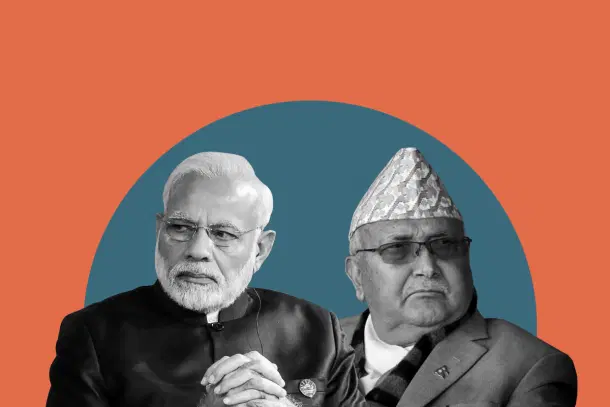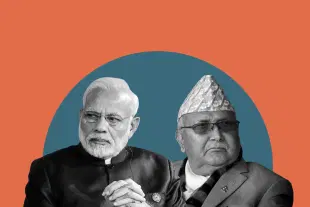World
Prime Minister Modi Appeals For Peace As Political Crisis Deepens In Nepal Amid Gen Z Protest Against Corruption, Nepotism
Swarajya Staff
Sep 10, 2025, 09:56 AM | Updated 10:00 AM IST
Save & read from anywhere!
Bookmark stories for easy access on any device or the Swarajya app.


Amid the collapse of KP Sharma Oli’s government in Nepal following days of violent anti-corruption protests, Prime Minister Narendra Modi on Tuesday (9 September) expressed “deep anguish” over the bloodshed and stressed that peace and stability in the Himalayan nation remain of vital importance to India.
Chairing a meeting of the Cabinet Committee on Security (CCS) after returning from official visits to Himachal Pradesh and Punjab, Modi reviewed the situation across Nepal, where at least 19 people—mostly young demonstrators—have been killed in police firing and over 400 injured.
In a post on X, PM Modi said, "On my return from Himachal Pradesh and Punjab today, a meeting of the Cabinet Committee on Security discussed the developments in Nepal. The violence in Nepal is heart-rending. I am anguished that many young people have lost their lives. The stability, peace and prosperity of Nepal are of utmost importance to us. I humbly appeal to all my brothers and sisters in Nepal to support peace.”
Political Crisis in Nepal
The appeal from PM Modi comes amid Nepal’s worst political unrest in years.
Nepalese Prime Minister KP Sharma Oli resigned on Tuesday following a deadly police crackdown on anti-corruption protests that killed at least 19 people and injured more than 400.
The protests, led by Nepal’s youth-driven “Gen Z” movement, began as demonstrations against corruption, nepotism and systemic failures but escalated dramatically after security forces opened fire on unarmed protesters on Monday.
Within hours, Home Minister Ramesh Lekhak resigned, followed by Oli’s resignation on Tuesday under mounting pressure.
Oli’s departure ends his fourth term as Nepal’s Prime Minister, which began in July 2024 with backing from the Nepali Congress.
His latest tenure collapsed amid nationwide outrage and unprecedented violence.
Unprecedented Violence and Destruction
Despite the Prime Minister’s resignation, unrest spread across Kathmandu and other cities.
Demonstrators stormed the Parliament building, set fire to the Nepali Congress Central Office, and targeted the homes of senior political leaders and officials.
Among those attacked were residences of Communication Minister Prithvi Subba Gurung, Deputy Prime Minister Bishnu Paudel, former Home Minister Ramesh Lekhak, Nepal Rastra Bank Governor Biswo Paudel, and even former Prime Minister Sher Bahadur Deuba.
Protesters also hurled stones at opposition leader Pushpa Kamal Dahal ‘Prachanda’s residence.
The scale of the violence forced Tribhuvan International Airport to suspend flights after smoke was reported near Koteshwar, though authorities clarified the airport had not been formally closed.
Army Steps In
As the situation spiraled, the Nepal Army assumed control of national security from 10 pm Tuesday.
In a statement, it assured citizens of its commitment to protect life and property and urged restraint: “Nepal Army is always committed to protect the interests and security of Nepalese people… We request all the youths and the entire countrymen to remain calm and maintain social harmony and national unity so that the present situation doesn’t deteriorate further.”
Helicopters were deployed to evacuate ministers from their official residences, while curfews were imposed across several districts.
Calls for Calm
Kathmandu Metropolitan City Mayor Balendra Shah also appealed for restraint, reminding citizens that public and private property are shared national assets.
But his plea, along with Oli’s resignation, has done little to quell the anger.
Protesters vow to continue until systemic reforms and accountability are ensured.
Regional Concern
The developments in Nepal have drawn international concern, particularly in India, which shares deep historical, cultural, and strategic ties with the Himalayan nation.
PM Modi’s remarks reflect New Delhi’s anxiety over instability in its neighborhood and underline India’s emphasis on peace and prosperity in Nepal.
Please click here to add Swarajya as your preferred and trusted news source on Google.
Also Read: Nepal PM KP Sharma Oli Resigns Amid Nationwide Gen Z Protests Over Social Media Ban





